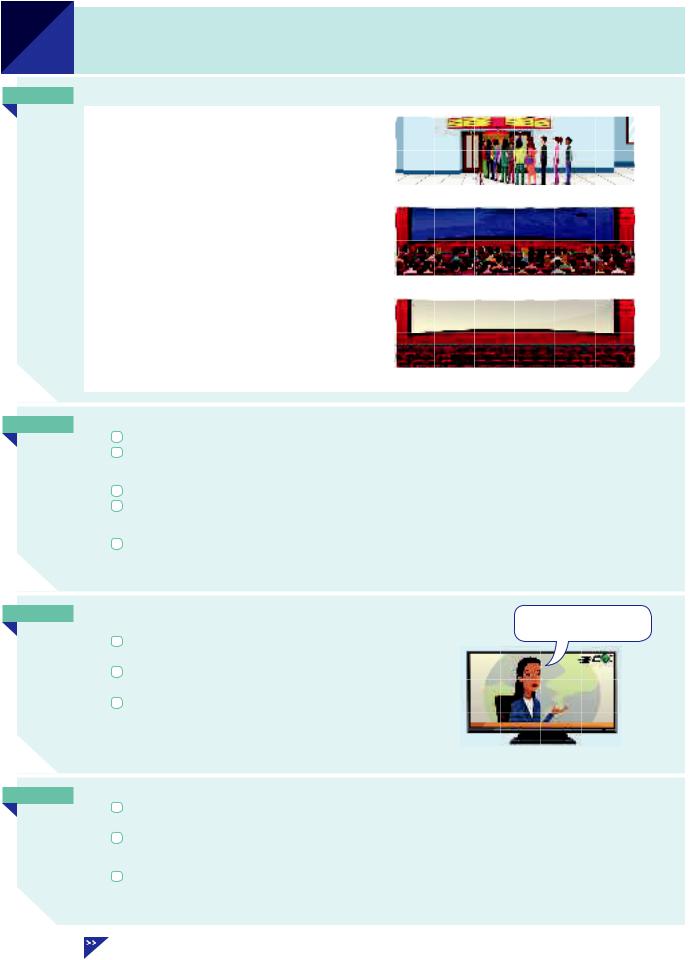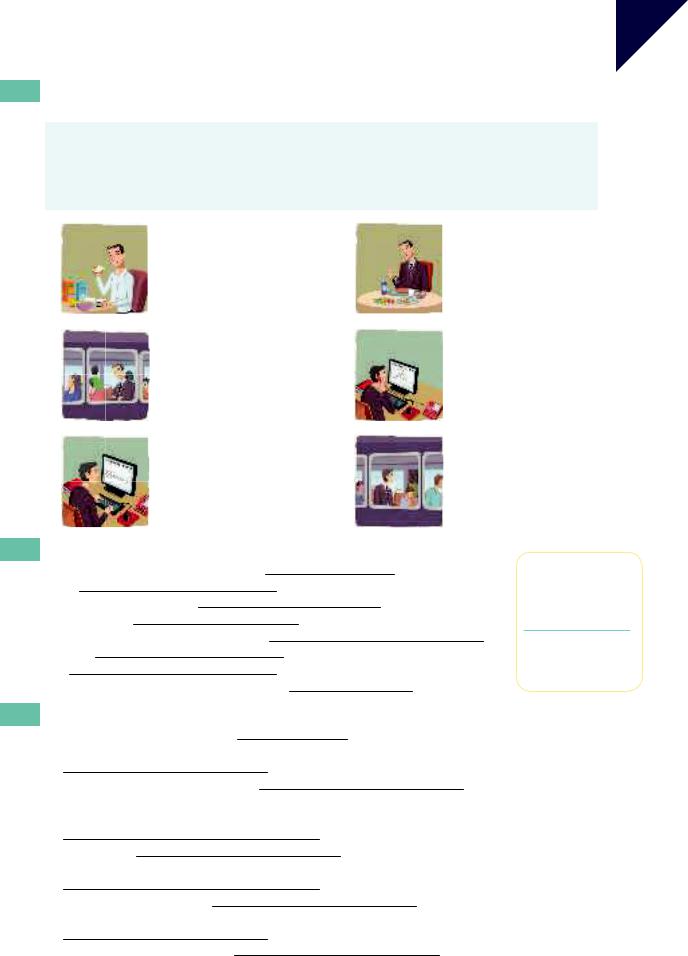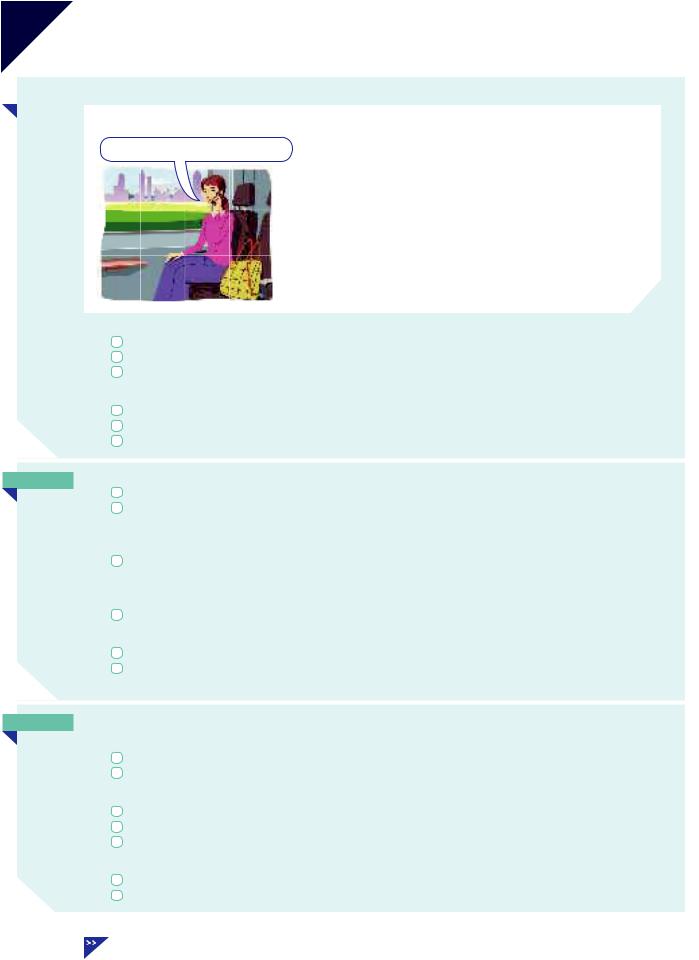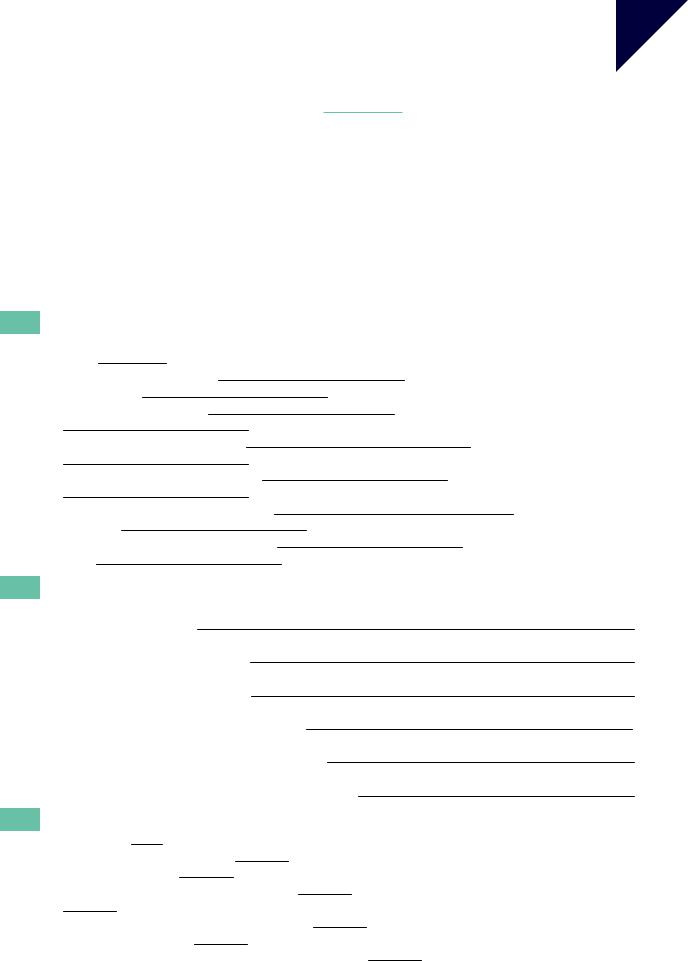
- •Contents
- •Thanks
- •To the student
- •To the teacher
- •3 Present continuous and present simple 1 (I am doing and I do)
- •10 Present perfect continuous and simple (I have been doing and I have done)
- •11 how long have you (been) … ?
- •12 for and since when … ? and how long … ?
- •13 Present perfect and past 1 (I have done and I did)
- •14 Present perfect and past 2 (I have done and I did)
- •15 Past perfect (I had done)
- •16 Past perfect continuous (I had been doing)
- •17 have and have got
- •18 used to (do)
- •19 Present tenses (I am doing / I do) for the future
- •20 I’m going to (do)
- •21 will and shall 1
- •22 will and shall 2
- •23 I will and I’m going to
- •24 will be doing and will have done
- •26 can, could and (be) able to
- •27 could (do) and could have (done)
- •28 must and can’t
- •29 may and might 1
- •30 may and might 2
- •31 have to and must
- •32 must mustn’t needn’t
- •33 should 1
- •34 should 2
- •35 I’d better … it’s time …
- •36 would
- •39 if I knew … I wish I knew …
- •40 if I had known … I wish I had known …
- •41 wish
- •42 Passive 1 (is done / was done)
- •43 Passive 2 (be done / been done / being done)
- •44 Passive 3
- •45 it is said that … he is said to … he is supposed to …
- •46 have something done
- •47 Reported speech 1 (he said that …)
- •48 Reported speech 2
- •49 Questions 1
- •52 Question tags (do you? isn’t it? etc.)
- •53 Verb + -ing (enjoy doing / stop doing etc.)
- •54 Verb + to … (decide to … / forget to … etc.)
- •55 Verb (+ object) + to … (I want you to …)
- •56 Verb + -ing or to … 1 (remember, regret etc.)
- •57 Verb + -ing or to … 2 (try, need, help)
- •58 Verb + -ing or to … 3 (like / would like etc.)
- •59 prefer and would rather
- •60 Preposition (in/for/about etc.) + -ing
- •61 be/get used to … (I’m used to …)
- •63 there’s no point in -ing, it’s worth -ing etc.
- •64 to … , for … and so that …
- •65 Adjective + to …
- •66 to … (afraid to do) and preposition + -ing (afraid of -ing)
- •67 see somebody do and see somebody doing
- •68 -ing clauses (He hurt his knee playing football.)
- •69 Countable and uncountable 1
- •70 Countable and uncountable 2
- •71 Countable nouns with a/an and some
- •74 the 2 (school / the school etc.)
- •75 the 3 (children / the children)
- •77 Names with and without the 1
- •78 Names with and without the 2
- •79 Singular and plural
- •80 Noun + noun (a bus driver / a headache)
- •81 -’s (your sister’s name) and of … (the name of the book)
- •82 myself/yourself/themselves etc.
- •83 a friend of mine my own house on my own / by myself
- •84 there … and it …
- •85 some and any
- •87 much, many, little, few, a lot, plenty
- •90 all every whole
- •91 each and every
- •92 Relative clauses 1: clauses with who/that/which
- •94 Relative clauses 3: whose/whom/where
- •95 Relative clauses 4: extra information clauses (1)
- •96 Relative clauses 5: extra information clauses (2)
- •97 -ing and -ed clauses (the woman talking to Tom, the boy injured in the accident)
- •98 Adjectives ending in -ing and -ed (boring/bored etc.)
- •99 Adjectives: a nice new house, you look tired
- •100 Adjectives and adverbs 1 (quick/quickly)
- •102 so and such
- •104 quite, pretty, rather and fairly
- •105 Comparative 1 (cheaper, more expensive etc.)
- •106 Comparative 2 (much better / any better etc.)
- •107 Comparative 3 (as … as / than)
- •108 Superlative (the longest / the most enjoyable etc.)
- •109 Word order 1: verb + object; place and time
- •110 Word order 2: adverbs with the verb
- •111 still any more yet already
- •112 even
- •114 in case
- •116 as (as I walked … / as I was … etc.)
- •117 like and as
- •119 during for while
- •121 at/on/in (time)
- •122 on time and in time at the end and in the end
- •123 in/at/on (position) 1
- •124 in/at/on (position) 2
- •125 in/at/on (position) 3
- •126 to, at, in and into
- •127 in/on/at (other uses)
- •129 Noun + preposition (reason for, cause of etc.)
- •130 Adjective + preposition 1
- •131 Adjective + preposition 2
- •132 Verb + preposition 1 to and at
- •134 Verb + preposition 3 about and of
- •135 Verb + preposition 4 of/for/from/on
- •136 Verb + preposition 5 in/into/with/to/on
- •137 Phrasal verbs 1 Introduction
- •138 Phrasal verbs 2 in/out
- •139 Phrasal verbs 3 out
- •142 Phrasal verbs 6 up/down
- •143 Phrasal verbs 7 up (1)
- •144 Phrasal verbs 8 up (2)
- •145 Phrasal verbs 9 away/back
- •Additional exercises
- •Study guide
- •Key to Exercises
- •Key to Additional exercises (see page 302)
- •Key to Study guide
- •Index

Unit
24 will be doing and will have done
AStudy this example situation:
These people are standing in a queue to get into the cinema.
now
Half an hour from now, the cinema will be full.
Everyone will be watching the film.
half an hour from now
Three hours from now, the cinema will be empty.
The film will have finished.
Everyone will have gone home.
three hours from now
BI will be doing something (future continuous) = I will be in the middle of doing it:
This time next week I’ll be on holiday. I’ll be lying on the beach or swimming in the sea. You have no chance of getting the job. You’ll be wasting your time if you apply.
Compare will be (do)ing and will (do):
Don’t phone between 7 and 8. We’ll be eating.
Let’s wait for Liz to arrive and then we’ll eat.
Compare:
At 10 o’clock yesterday, Tina was in her of ice. She was working. (past continuous) It’s 10 o’clock now. She is in her of ice. She is working. (present continuous)
At 10 o’clock tomorrow, she will be in her of ice. She will be working. (future continuous)
CWe also use will be -ing to talk about complete actions in the future.
For example:
The government will be making a statement about the crisis later today.
Later in the programme, I’ll be talking to the Minister of Education.
The team’s star player is injured and won’t be playing in the game on Saturday.
When we use it in this way, will be (doing) is similar to will (do) and going to (do).
Later in the programme,
I’ll be talking to …
DI will have done something (future perfect) = it will be complete before a time in the future. For example:
Sally always leaves for work at 8.30 in the morning. She won’t be at home at 9 o’clock – she’ll have gone to work.
We’re late. The film will already have started by the time we get to the cinema.
Compare:
Ted and Amy have been married for 24 years. (present perfect) Next year they will have been married for 25 years. (future perfect)
When their son was born, they had been married for three years. (past perfect)
48 |
will Units 21–22 by then / by the time Unit 120 The future Appendix 3 |

Exercises |
Unit |
24 |
|
|
|
24.1Read about Andy. Then tick ( ) the sentences which are true. In each group of sentences at least one is true.
Andy goes to work every day. He leaves home at 8 o’clock and arrives at work at about 8.45. He starts work immediately and continues until 12.30 when he has lunch (which takes about half an hour). He starts work again at 1.15 and goes home at exactly 4.30. Every day he follows the same routine and tomorrow will be no exception.
1 |
At 7.45 |
4 |
At 12.45 |
||
|
a |
he’llbeleavingthehouse |
|
a |
he’llhavelunch |
|
b |
he’llhaveletthehouse |
|
b |
he’llbehavinglunch |
|
c |
he’llbeathome |
|
c |
he’llhavefinishedhislunch |
|
d |
he’llbehavingbreakfast |
|
d |
he’llhavestartedhislunch |
2 |
At 8.15 |
5 |
At 4 o’clock |
||
|
a |
he’llbeleavingthehouse |
|
a |
he’llhavefinishedwork |
|
b |
he’llhaveletthehouse |
|
b |
he’llfinishwork |
|
c |
he’llhavearrivedatwork |
|
c |
he’llbeworking |
|
d |
he’llbearrivingatwork |
|
d |
hewon’thavefinishedwork |
3 |
At 9.15 |
6 |
At 4.45 |
||
|
a |
he’llbeworking |
|
a |
he’llleavework |
|
b |
he’llstartwork |
|
b |
he’llbeleavingwork |
|
c |
he’llhavestartedwork |
|
c |
he’llhaveletwork |
|
d |
he’llbearrivingatwork |
|
d |
he’llhavearrivedhome |
24.2 Complete the sentences. Choose from the box.
1 |
There’s an election next week. Who |
will |
you be voting for? |
2 |
I’ll |
shopping later. Can I get you anything? |
|
3 |
Emily is not well, so she |
|
volleyball tomorrow. |
4 |
Little Emma |
|
school soon. She’s growing up fast. |
5 |
The match is on TV tonight. Will you |
|
it? |
6 |
What |
in your new job? The same as before? |
|
7 |
I |
to the wedding. I’ll be away on holiday. |
|
8 |
Please fasten your seat belts. The plane |
in ten minutes. |
|
24.3 Put the verb into the correct form, will be (do)ing or will have (done).
be watching will be landing won’t be playing will be starting will you be voting won’t be going be going
will you be doing
1 |
Don’t phone between 7 and 8. We’ll be |
eating then. (we / eat) |
2 |
Tomorrow at ernoon we’re going to play tennis from 3 o’clock until 4.30. So at 4 o’clock, |
|
|
tennis. (we / play) |
|
3 |
Sarah will meet you at the station. |
for you when you arrive. |
|
(she / wait) |
|
4 |
The meeting starts at 9.30 and won’t last longer than an hour. You can be sure that |
|
|
|
by 11 o’clock. (it / finish) |
5 |
Do you think |
in the same place in ten years’ time? (you / still / live) |
6 |
Lisa is travelling in Europe and so far she has travelled about 1,000 miles. By the end of the trip, |
|
|
|
more than 3,000 miles. (she / travel) |
7 |
If you need to contact me, |
at the Lion Hotel until Friday. (I / stay) |
8 |
Ben is on holiday and is spending his money very quickly. If he continues like this, |
|
|
all his money before the end of his holiday. (he / spend) |
|
9 |
I’m fed up with my job. I hope |
it much longer. (I / not / do) |
Additional exercises 12–13 (pages 309–10) |
49 |

|
Unit |
|
|
|
|
|
when I do and when I’ve done |
if and when |
|||
|
25 |
||||
|
|
|
|
|
|
|
|
Study this example: |
|
|
|
|
A |
|
|
||
|
|
|
Amy is on a train. She’s calling a friend. |
‘I’ll call you again later when I arrive’ is a sentence |
|
|
|
|
|
with two parts: |
|
|
|
|
I’ll call you again later when I arrive. |
|
|
|
|
|
the main part: |
I’ll call you again later |
|
|
|
|
|
and when …: |
when I arrive |
The time is future (‘later’), but Amy says:
… when I arrive (not when I will arrive) We say
when I do something (not will do)
when something happens (not will happen)
Some more examples:
We’ll go out when it stops raining. (not when it will stop)
When you are here again, you must come and see us. (not When you will be)
Don’t forget to lock the door when you go out. (not will go)
The same thing happens ater while / before / ater / as soon as / until:
What are you going to do while I’m away? (not while I will be)
Before you go, there’s something I want to ask you.
Wait here until I come back. or … till I come back.
BYou can also use the present perfect (have done) ater when / ater / until / as soon as:
Can I have the newspaper when you’ve finished with it?
Don’t say anything while Ian is here. Wait until he has gone.
We use the present perfect to show that one thing is complete before the other. The two things do not happen together:
When I’ve phoned Kate, we can go out.
(= first I’ll phone Kate and at er that we can go out)
Do not use the present perfect if the two things happen together:
When I phone Kate, I’ll ask her about the party. (not when I’ve phoned)
It is oten possible to use either the present simple or the present perfect:
I’ll come as soon as I finish. |
or |
I’ll come as soon as I’ve finished. |
You’ll feel better ater you have |
or |
You’ll feel better ater you’ve had |
something to eat. |
|
something to eat. |
Cif and when
Ater if, we normally use the present (if I do / if I see etc.) for the future:
I’ll be angry if it happens again. (not if it will happen)
Hurry up! If we don’t hurry, we’ll be late.
We use if (not when) for things that will possibly happen (or not happen):
If it is raining this evening, I won’t go out. (not when it is raining)
Don’t worry if I’m late tonight. (not when I’m late)
If they don’t come soon, I’m not going to wait for them.
We use when for things which are sure to happen. Compare:
I might go out later. (it’s possible) If I go out, I’ll get some bread.
I’m going out later. (for sure) When I go out, I’ll get some bread.
50 |
if Units 38–40 even if / even when Unit 112D unless → Unit 115 |

Exercises |
|
Unit |
|||
|
25 |
||||
|
|
|
|
|
|
|
|
|
|
||
25.1 |
Which is correct? |
|
|
||
1 |
Don’t forget to lock the door when you go out / |
you’ll go out. |
(you go out is correct) |
||
2 |
As soon as we get any more information, we let / we’ll let you know. |
||||
3 |
I want to get to the cinema before the film starts / will start. |
|
|
||
4 |
Don’t drive through a red light. Wait until it changes / it will change to green. |
||||
5 |
Sarah will be here soon. I make / I’ll make some cofee when she comes. |
||||
6 |
I’m 20 now. I wonder where I’ll be when I’m 40 / I’ll be 40. |
|
|
||
7 |
I wait / I’ll wait for you until you’re ready, but don’t be long. |
|
|
||
8 |
Oliver is five years old. He wants to be a TV presenter when he grows up / he’ll grow up. |
||||
9 |
We could meet for cofee tomorrow morning if you’re / you will be free. |
||||
10If the weather is / will be nice tomorrow, we’re going to the beach.
11Vicky is / will be very disappointed if she doesn’t get a place at university.
12You’ll feel better ater you’ve had / you’ll have something to eat.
25.2Complete the sentences using the verbs in brackets. Use will/won’t or the present (see/plays/are etc.).
1 |
When you are (you / be) here again, you must come and see us. |
|
2 |
I want to see Sophie before |
(she / go) away next week. |
3 |
Call me when |
(you / know) what time you’re going to get here. |
4 |
There’s no need to hurry. |
(I / wait) for you until |
|
(you / be) ready. |
|
5 |
I’m going out for about an hour. |
(you / still / be) here when |
|
(I / get) back? |
|
6 |
I think everything will be fine, but if |
(there / be) any problems, |
|
(I / let) you know, OK? |
|
7 |
Kate looks completely diferent now. |
(you / not / recognise) |
|
her when |
(you / see) her again. |
8 |
I’m going to be away for a few days. If |
(you / need) to contact me |
|
while |
(I / be) away, you can call me. |
25.3 Read the situations and complete the sentences.
1 |
You and a friend want to go out, but it’s raining hard. You don’t want to get wet. |
|
|
You say: Let’s wait until it stops raining |
. |
2 |
You’re visiting a friend. It’s going to get dark soon, and you want to leave before that. |
|
|
You ask: I’d better go now before |
. |
3 |
You want to sell your car. Mark is interested in buying it, but he hasn’t decided yet. |
|
|
You ask: Let me know as soon as |
. |
4 |
Your friends are going to Hong Kong soon. You want to know where they’re going to stay. |
|
|
You ask: Where are you going to stay when |
? |
5 |
The trafic is bad in your town, but they are going to build a new road. |
|
|
You say: I think things will be better when they |
. |
6 |
Someone you know has been very rude to you. You want her to apologise. |
|
|
You say (to someone else): I won’t speak to her until |
. |
25.4 Put in when or if.
1 |
Don’t worry if I’m late tonight. |
|
|
2 |
Be careful. You’ll hurt yourself |
you fall. |
|
3 |
I’m going shopping. |
you want anything, I can get it for you. |
|
4 |
I’m going away for a few days. I’ll call you |
I get back. |
|
5I don’t see you tomorrow, when will I see you again?
6 |
I’m watching a programme on TV right now. |
it finishes, I’m going to bed. |
|
7 |
We can eat at home or, |
you prefer, we can go to a restaurant. |
|
8 |
I hope Sarah can come to the party. It will be a shame |
she can’t come. |
|
Additional exercises 12–15 (pages 309–11), 32 (page 321) |
51 |
